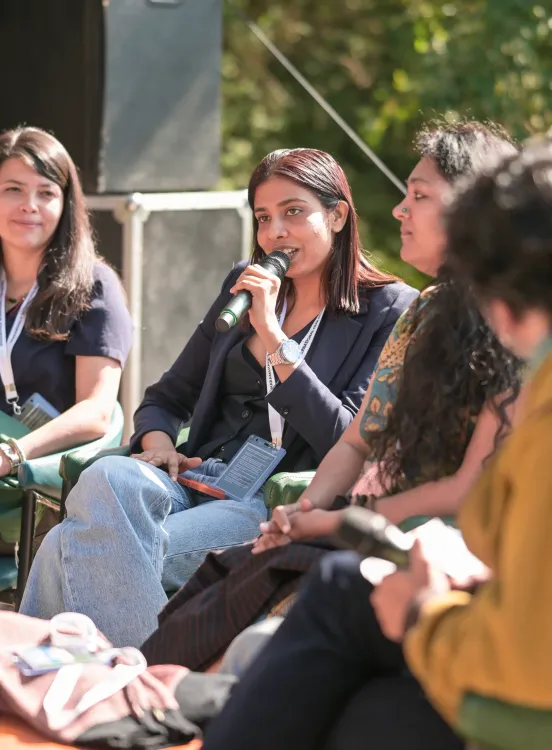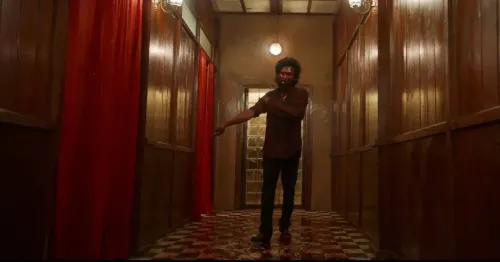How Did Anuparna Roy's ‘Songs of Forgotten Trees’ Rough Cut Make It to Venice?

Synopsis
Key Takeaways
- Anuparna Roy emphasizes the emotional drive behind filmmaking.
- The significance of authentic storytelling in cinema is crucial.
- Independent cinema faces challenges, yet it continues to thrive.
- Collaboration among filmmakers can lead to impactful narratives.
- Festivals like DIFF provide essential platforms for indie films.
Dharamshala, Nov 1 (NationPress) Filmmaker Anuparna Roy, whose ‘Songs of Forgotten Trees’ is set to be the closing film at this year’s Dharamshala International Film Festival (DIFF), discussed the journey of how the rough cut of ‘Songs of Forgotten Trees’ found its way to Venice.
DIFF featured two significant sessions, including a special masterclass dedicated to the legendary filmmaker Andrei Tarkovsky, which was attended by his son Andrey Tarkovsky.
The day commenced with a panel discussion titled “From Vision to Reality: The Making of Indie Cinema,” featuring Anuparna Roy, ‘Sabar Bonda’ director Rohan Parashuram Kanawade, Bhutanese filmmaker Dechen Wangmo Roder, and director Nidhi Saxena of ‘Secret of a Mountain Serpent’. The session was moderated by Prathyush Parasuraman.
“I don’t believe filmmakers create movies solely for festivals; they are driven by emotion and a desire to express something,” stated Roy, who was honored with the Orizzonti Award for Best Director at the 2025 Venice International Film Festival.
The filmmaker recounted how a sense of urgency propelled her debut feature into Venice. “I submitted a very rough cut to the festival! They had already shortlisted seven Indian films, and we were behind schedule. On July 18th, they informed us they were considering our film. It was an incredible experience; the film was well-received, and audiences appreciated the concept of two women.”
Joining her on the panel, ‘Sabar Bonda’ director Rohan Kanawade shared that his Sundance-winning film faced challenges in being marketed by several European and American sales agents.
“They told me, ‘Sorry, we are passing on the film.’ I questioned whether I should create a film that would be easier for them to sell. However, I can’t compromise my vision; I will craft a film that aligns with my artistic vision. Authenticity and patience are essential,” said Kanawade.
He also highlighted that September marked a pivotal month for independent cinema, with acclaimed films like Sabar Bonda, Jugnuma, and Humans in the Loop securing theatrical releases.
“In the coming years, we should move beyond labels like independent or non-independent... Cinema should simply be cinema. Last month saw numerous films released in theaters, and audiences responded positively. We must give films a chance; if they are accessible, people will watch them.”
Dechen Wangmo Roder discussed the practical difficulties of maintaining creativity within tight budgets, stating, “Certainly, shooting on a low budget is challenging, but I feel it’s my only option at this point—to compromise on the budget. For my next film, we secured a grant of Rs 10 lakhs, and we’re optimistic about it. We don’t need to rely on others.”
Nidhi Saxena, director of two acclaimed indie films, ‘Secret of a Mountain Serpent’ and ‘Sad Letters of an Imaginary Woman’, reflected on the challenges of working without institutional support.
“I understand that no Indian or foreign producer is likely to fund an experimental film. My projects were only feasible due to serendipity. To create my first film, I sold personal belongings, and for the second, I had nothing left to sell, so I focused on applying for grants.”
Later in the day, the special session “Spiritual Cinema” featured Andrey Tarkovsky in a dialogue with Tenzing Sonam, where he reflected on his father’s remarkable legacy.
“Growing up with him was akin to experiencing his art firsthand, as he was a very communicative individual. We often discussed art, cinema, and spiritual exploration, which was incredibly stimulating for me as a child,” the filmmaker shared at the festival, which also showcased his films ‘Andrey Tarkovsky: A Cinema Prayer’ and ‘Nostalghia’.
This year’s DIFF 2025 commenced with sold-out screenings of Neeraj Ghaywan’s ‘Homebound’ on Thursday. The festival runs from October 30 to November 2.









